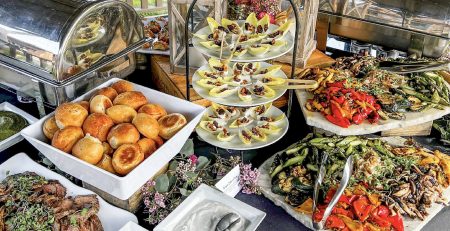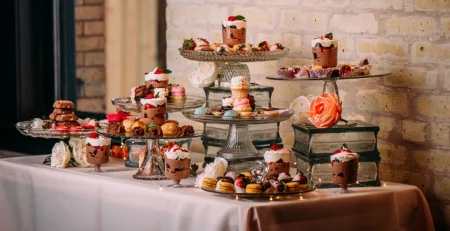Solving Common Event Catering Dilemmas A Comprehensive Guide
Introduction
Catering is the heart of any event, whether it’s a wedding, corporate gathering, or birthday bash. It’s more than just serving food; it’s about creating an experience that guests will remember. However, the road to delivering flawless catering services is often riddled with challenges. From understanding client needs to dealing with unexpected hiccups, event planners and caterers must be prepared to tackle a range of dilemmas. This comprehensive guide aims to address these common issues and provide actionable solutions to ensure your event catering runs smoothly.
Understanding Your Client’s Needs
One of the most important aspects of event catering is understanding what your client wants. Miscommunication can lead to unmet expectations, which can spell disaster for any event.
Importance of Communication
Effective communication is key to understanding the specific requirements of an event. Here are some tips to ensure you gather all the necessary information:
- Initial Consultation: Schedule a detailed meeting with your client to discuss their vision for the event.
- Questionnaires: Use questionnaires to gather specific details about guest preferences, dietary restrictions, and other essential factors.
- Regular Updates: Keep the lines of communication open with regular updates and follow-ups to ensure you’re on the same page.
Gathering Detailed Information
To avoid any last-minute surprises, make sure you cover the following areas:
- Event Type and Theme: Understand the nature of the event and its theme to tailor your catering services accordingly.
- Guest Demographics: Knowing the age group, cultural background, and preferences of the guests can help in menu planning.
- Special Requests: Pay attention to any special requests or unique requirements the client may have.
Menu Planning and Customization
Creating a menu that appeals to a diverse group of guests while accommodating various dietary needs is a balancing act.
Diverse and Appealing Menu
Here are some strategies for crafting a menu that will impress:
- Variety: Offer a mix of appetizers, main courses, and desserts that cater to different tastes.
- Seasonal Ingredients: Use seasonal ingredients to ensure freshness and enhance the flavor of your dishes.
- Presentation: Remember, people eat with their eyes first. A well-presented dish can elevate the dining experience.
Accommodating Dietary Restrictions
Dietary restrictions are becoming increasingly common. To ensure all guests have a delightful experience:
- Vegan and Vegetarian Options: Always have vegan and vegetarian options available.
- Allergy-Friendly Choices: Label dishes clearly and provide alternatives for common allergens like nuts, gluten, and dairy.
- Customization: Be willing to customize dishes to meet specific dietary needs.
Logistics and Timing
Successful event catering hinges on meticulous planning and flawless execution.
Planning and Execution
To manage catering logistics effectively:
- Venue Visit: Visit the venue in advance to understand the layout and facilities available.
- Detailed Timeline: Create a detailed timeline that outlines every step from food preparation to delivery and setup.
- Staff Coordination: Ensure your team is well-coordinated and aware of their roles and responsibilities.
Managing Food Preparation and Delivery
Timing is everything in catering:
- Prep Work: Complete as much prep work as possible before arriving at the venue.
- Staggered Cooking: Cook dishes that can be served hot just before they are needed.
- Delivery Plan: Have a clear plan for transporting food to the venue, ensuring it arrives fresh and intact.
Dealing with Unexpected Issues
No matter how well you plan, unexpected challenges can still arise.
Common Challenges and Solutions
Here are some common issues and how to handle them:
- Last-Minute Changes: Stay flexible and be prepared to make last-minute adjustments to the menu or setup.
- Equipment Failure: Have backup equipment and tools on hand to deal with any technical problems.
- Weather Conditions: For outdoor events, always have a contingency plan in case of bad weather.
Maintaining Flexibility and Preparedness
- Backup Plans: Always have a Plan B ready for every critical aspect of your catering service.
- Emergency Kit: Keep an emergency kit with essentials like extra utensils, first-aid supplies, and cleaning materials.
Budgeting and Pricing
Setting fair and competitive prices while managing costs is crucial for a successful catering business.
Setting Fair Prices
To set prices that reflect the value of your services:
- Market Research: Conduct market research to understand the going rates for similar services in your area.
- Cost Calculation: Calculate all costs involved, including ingredients, labor, and overheads, before setting your prices.
- Value Proposition: Highlight the unique aspects of your service that justify your pricing.
Managing Costs Without Compromising Quality
Here are some strategies for cost management:
- Bulk Purchasing: Buy ingredients in bulk to reduce costs.
- Seasonal Ingredients: Use seasonal ingredients, which are often cheaper and of better quality.
- Efficient Planning: Plan your menu and operations efficiently to minimize waste and reduce unnecessary expenses.
Leveraging Technology for Efficiency
Modern technology can significantly streamline catering operations and improve efficiency.
Catering Software and Tools
Some tools and software can help you manage your catering business more effectively:
- Event Management Software: Tools like Cater ease and Total Party Planner can help you manage bookings, menus, and schedules.
- Communication Tools: Use platforms like Slack or Microsoft Teams for seamless communication with your team.
- Inventory Management: Utilize inventory management software to keep track of ingredients and supplies.
Effective Communication and Collaboration Tools
To ensure smooth operations:
- Project Management Tools: Tools like Trello or Asana can help you keep track of tasks and deadlines.
- Customer Relationship Management (CRM): Use CRM software to manage client interactions and build strong relationships.
Conclusion
Catering is a complex yet rewarding field that requires meticulous planning, adaptability, and a keen understanding of client needs. By addressing common dilemmas and leveraging technology, event planners and caterers can deliver exceptional services that leave a lasting impression.
Remember, every challenge is an opportunity to learn and improve. Stay committed to excellence, and your efforts will surely pay off.
Call to Action
If you found this guide helpful, don’t hesitate to share it with fellow event planners and caterers. For more tips and insights, explore our related content or sign up for our newsletter. Together, let’s elevate the art of event catering!
—
This comprehensive guide aims to provide valuable insights and practical solutions for event planners, caterers, and small business owners. By following these best practices, you can ensure your catering services are top-notch and well-received.















Leave a Reply